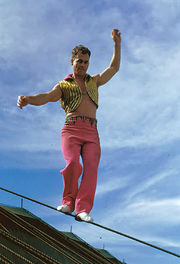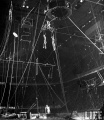Difference between revisions of "Harold Alzana"
From Circopedia
(→From The Coalmine To The Big Top) |
(→Solo Star Performer) |
||
| (2 intermediate revisions by the same user not shown) | |||
| Line 22: | Line 22: | ||
Staging the ''impression of danger'' is common circus practice, but it doesn’t preclude the ''reality of danger'', whether it is or not apparent to the audience. Harold Alzana had his share of accidents, including one in his very first season with ''The Greatest Show On Earth''—a forty-feet fall with his sister Hilda, in which both performers were injured. Eventually, Hilda and Elsie decided to retire from the act, and Harold continued to work as a solo performer, with increasing success. | Staging the ''impression of danger'' is common circus practice, but it doesn’t preclude the ''reality of danger'', whether it is or not apparent to the audience. Harold Alzana had his share of accidents, including one in his very first season with ''The Greatest Show On Earth''—a forty-feet fall with his sister Hilda, in which both performers were injured. Eventually, Hilda and Elsie decided to retire from the act, and Harold continued to work as a solo performer, with increasing success. | ||
| − | Harold Alzana remained with Ringling Bros. and Barnum & Bailey until 1964. During that time he returned to Europe only twice: The first time for the Christmas season of 1949-50 | + | Harold Alzana remained with Ringling Bros. and Barnum & Bailey until 1964. During that time he returned to Europe only twice: The first time for the Christmas season of 1949-50 at the [[Harringay Circus|Harringay Arena]] in London; the second time in 1963, with ''The Greatest Show On Earth'', in a short-lived European tour that was a disappointment and was quickly aborted—although Alzana’s personal success was as big in Europe as it had been in the United States. He made a last appearance in Europe in 1966, in the hit British television show, ''Hippodrome'' (known in the United States as ''Live From The Hippodrome''). |
Harold Alzana continued to perform sporadically until the early 1970s, and then retired to his home of Sarasota, Florida, America’s "Circus Capital." But he kept a wire rigged in his backyard, and continued to practice regularly, well into his eighties. In 1991, he was induced into the [[International Circus Hall of Fame]] in Peru, Indiana. Harold Alzana passed away on February 23, 2001, leaving the souvenir of one of the greatest high wire performers of all times. | Harold Alzana continued to perform sporadically until the early 1970s, and then retired to his home of Sarasota, Florida, America’s "Circus Capital." But he kept a wire rigged in his backyard, and continued to practice regularly, well into his eighties. In 1991, he was induced into the [[International Circus Hall of Fame]] in Peru, Indiana. Harold Alzana passed away on February 23, 2001, leaving the souvenir of one of the greatest high wire performers of all times. | ||
Latest revision as of 17:18, 11 June 2014
High Wire
By Dominique Jando
Harold Alzana was, from the late forties to the mid-sixties, a star fixture of Ringling Bros. and Barnum and Bailey Circus. His daredevil manner—working on the high wireA tight, heavy metallic cable placed high above the ground, on which wire walkers do crossings and various acrobatic exercises. Not to be confused with a tight wire. without a balancing pole and at high speed, which contrasted with the traditionally slow, seemingly careful, approach of the great high wireA tight, heavy metallic cable placed high above the ground, on which wire walkers do crossings and various acrobatic exercises. Not to be confused with a tight wire. acrobats, such as The Wallendas, that had preceded him—inspired many of the high wireA tight, heavy metallic cable placed high above the ground, on which wire walkers do crossings and various acrobatic exercises. Not to be confused with a tight wire. acts that are seen today.
He was born Harold Davis on September 19, 1917 in Maltby, a small mining town east of Sheffield in South Yorkshire, England. His father, Charles, worked there as a coal miner, but he was also an amateur acrobat, and he began training his children (Harold, his brother Edgar, and their sisters Hilda and Elsie) in his backyard, where he had installed a tight wireA tight, light metallic cable, placed between two platforms not very far from the ground, on which a wire dancer perform dance steps, and acrobatic exercises such as somersaults. (Also: Low Wire) two feet off the ground.
Charles’s training got good results: At age six, young Harold made his performing debut in local fairs and festivals. But this was just fun; when he reached fourteen, Harold Davis, like most young men in Maltby, followed in his father’s footsteps and began working as a coal miner. In 1941, he married his sweetheart, Minnie. World War II was raging, but Harold and his siblings never stopped practicing and improving their high wireA tight, heavy metallic cable placed high above the ground, on which wire walkers do crossings and various acrobatic exercises. Not to be confused with a tight wire. act.
From The Coalmine To The Big Top
The war over, Harold Alzana decided to leave the darkness of Maltby coalmines and tempt his luck in the circus spotlights: It was social climbing in every sense of term! His break came in 1946, when impresario Clem Butson, then producer of Blackpool’s Tower Circus, gave "The Sensational Alzanas" (as Harold and his siblings had named their act) a contract for the summer season. The highlight of the act was Harold crossing the wire on a bicycle with his sisters hanging from a trapeze suspended under it.If it was certainly, from the audience point of view, a spectacular finale, it was not in actuality much of a trickAny specific exercise in a circus act. since the trapeze provided Harold’s bicycle with a counterweight: The more at risk were actually Hilda and Elsie. But Harold’s solos on the wire were another matter altogether, and this didn’t fail to impress one of John Ringling North’s European talent scouts. Johnny North immediately saw star potential in Harold Alzana, and the act was booked for the 1947 season of Ringling Bros. and Barnum & Bailey Circus, The Greatest Show On Earth.
Thus, the Alzanas moved to the United States, minus Edgar, who decided to stay in England. (Edgar would eventually create his own high wireA tight, heavy metallic cable placed high above the ground, on which wire walkers do crossings and various acrobatic exercises. Not to be confused with a tight wire. act, The Derricos.) Their first appearance at the Madison Square Garden in New York, where The Greatest Show On Earth traditionally began its season, was an unmitigated success. Harold started his act climbing a wire at a 45º angle up to his platform, without the help of a balancing pole. His various crossings with his sisters were interspersed with his fast-paced solos, notably a high-speed tempo rope skipping with carefully staged near-misses. Like his ascent to the platform, Harold's solos were all performed without balancing pole or safety device.
Solo Star Performer
Staging the impression of danger is common circus practice, but it doesn’t preclude the reality of danger, whether it is or not apparent to the audience. Harold Alzana had his share of accidents, including one in his very first season with The Greatest Show On Earth—a forty-feet fall with his sister Hilda, in which both performers were injured. Eventually, Hilda and Elsie decided to retire from the act, and Harold continued to work as a solo performer, with increasing success.
Harold Alzana remained with Ringling Bros. and Barnum & Bailey until 1964. During that time he returned to Europe only twice: The first time for the Christmas season of 1949-50 at the Harringay Arena in London; the second time in 1963, with The Greatest Show On Earth, in a short-lived European tour that was a disappointment and was quickly aborted—although Alzana’s personal success was as big in Europe as it had been in the United States. He made a last appearance in Europe in 1966, in the hit British television show, Hippodrome (known in the United States as Live From The Hippodrome).
Harold Alzana continued to perform sporadically until the early 1970s, and then retired to his home of Sarasota, Florida, America’s "Circus Capital." But he kept a wire rigged in his backyard, and continued to practice regularly, well into his eighties. In 1991, he was induced into the International Circus Hall of Fame in Peru, Indiana. Harold Alzana passed away on February 23, 2001, leaving the souvenir of one of the greatest high wireA tight, heavy metallic cable placed high above the ground, on which wire walkers do crossings and various acrobatic exercises. Not to be confused with a tight wire. performers of all times.
See Also
- Video: Harold Alzana, High Wire in the TV show Hippodrome (1966)



